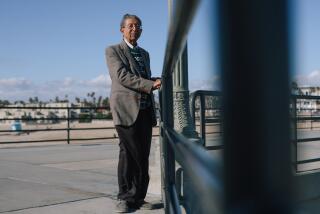Daily Prayer Gets Congressional Blessing : Government: Rep. Steve Stockman of Texas says nondenominational meetings in his office are voluntary. He adds that job-related decisions aren’t made on the basis of willingness to attend.
- Share via
WASHINGTON — As lawmakers and aides bustle around Capitol Hill each morning preparing for the day’s business, those in the office of Rep. Steve Stockman (R-Tex.) are praying.
Stockman, who defeated veteran Democrat Jack Brooks with a big assist from Christian conservatives last year, says he tells prospective employees he would like them to join the morning prayer sessions.
But he says that the nondenominational meetings are voluntary and that job-related decisions aren’t made on the basis of willingness to attend.
“We have got several people that don’t attend,” he said. Stockman himself rarely attends because of scheduling conflicts.
The American Civil Liberties Union contends the prayer meetings could be a violation of Title 7 of the Civil Rights Act, which protects against discrimination on the basis of race, sex, religion and national origin.
But Equal Employment Opportunity Commission spokesman Michael Widomski said that as long as the workplace prayer sessions are voluntary, they aren’t illegal.
Stockman, a Baptist who advocates prayer in schools, said he recognizes the controversy about mixing church and state. But he noted that Congress, the Supreme Court and other entities open with a prayer every day.
“It seems so second nature that I’m kind of surprised over the outcry,” he said after his informal prayer policy was reported by Roll Call, a Capitol Hill publication. “Throughout the campaign, we always had prayer and it didn’t seem like we should do anything different once we got elected,” Stockman said.
But B’nai B’rith, a Jewish organization that opposes intrusion of religion into government, questions Stockman’s emphasis on workplace prayer.
“We think that there’s certainly a significant and important place for prayer and religion in American society, but it’s an individual issue,” said B’nai B’rith spokesman Harvey Berk. “Whether somebody chooses to pray or have any expression of religion should have nothing to do with their ability to work.”
Replied Stockman: “I think it would be a good thing if more people in the House opened up in prayer.”
Stockman said his emphasis on organized prayer doesn’t affect his hiring or treatment of employees, pointing to his upcoming hire of a Jewish staffer. Asked if that new aide might feel pressured to attend the sessions, or excluded if he doesn’t, Stockman said, “He is a mature guy.”
The lawmaker acknowledged that his former top aide complained that the prayer meetings encroached on work time, but he said the disagreement had nothing to do with the aide’s departure in February after only a month on the job. The staffer, Dennis Stephens, declined to comment.
Kevin Bishop, Stockman’s press secretary, estimated that more than half of the 11 people on the Washington staff participate in the prayer meetings.
“If you’re here and you want to take part, then it’s certainly there for you,” Bishop said. “If you don’t want to take part, no one is twisting your arm and forcing you.”
Bishop strongly believes in the prayer meetings, which last five to 10 minutes. “It’s a time in the day to just get prepared for everything that is going to happen,” he said.
Recently, when his father was in the hospital, Bishop said he asked his colleagues to pray. “It comforted me. It comforted my family. It certainly comforted my father,” he said.
More to Read
Sign up for Essential California
The most important California stories and recommendations in your inbox every morning.
You may occasionally receive promotional content from the Los Angeles Times.













